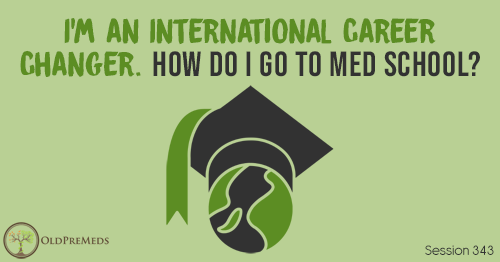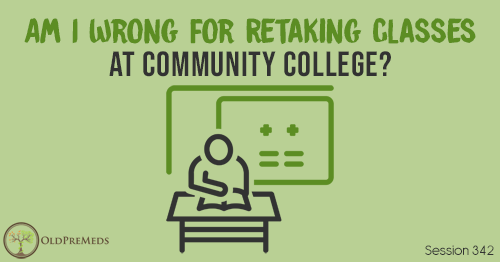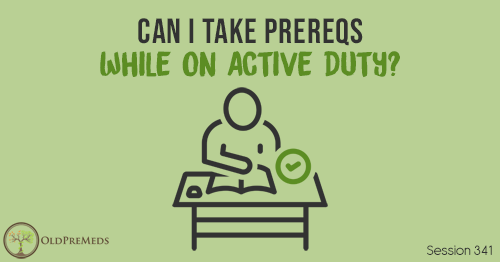Apple Podcasts | Google Podcasts
Session 10
Every week, we answer your questions here on the OldPreMeds Podcast where Ryan and Rich Levy again dive into the forums over at OldPreMeds.org, pull a question, and deliver the answers right on to you.
Today, however, is a fun and unique episode as we re-introduce Rich and get to know him more in-depth…
Here are the highlights of the conversation with Rich Levy
Rich’s path to the OldPreMeds.org
- Having the epiphany of wanting to go back to medical school in 2002
- Coming across the website for the National Society for Nontraditional Premedical and Medical Students, otherwise known as OldPreMeds.org, a small online group that he got involved with
- By 2005, Rich took over as the group’s business manager, running conferences
- Rich has helped develop the organization into a much more solid and effective resource for nontraditional students
- Getting to see all the sides of the medical school application process giving Rich a different view and understanding
Factors that did not allow Rich to go to medical school
- Personal relationships
- Monetary considerations
- Financial crisis
Lessons learned from taking the postbac
- To prove to medical schools that he can do it.
- To prove to your yourself that you want to do it, willing to work this hard and long to get to some place
Major takeaway from this episode
Consider postbac as much expensive place, time, effort, and resources to answer that question and realize in your first year that you can’t really do this.
Links and Other Resources
Check out Tim Horeczko’s podcast The Pediatrics Emergency Medicine Playbook
If you have questions you want answered here on the OldPremeds Podcast, go to oldpremeds.org and register for an account. Go into the forums and ask a question.
Listen to our first episode at OPMPodcast.com/1 to find out more about who we are.
Also check out the Premed Years Podcast at www.medicalschoolhq.net.
Find us on iTunes and go to opmpodcast.com/itunes and leave us a rating and review.
Check out MedEdMedia.com for all the shows that we produce including The Premed Years and the OldPreMeds Podcast. We will soon be launching a medical school podcast as well so stay tuned!
Email Dr. Ryan Gray at ryan@medicalschoolhq.net or connect with him on Twitter @medicalschoolhq.
Transcript
Introduction
Dr. Ryan Gray: The Old Premeds Podcast, session number 10.
You’re a nontraditional student entering the medical field on your terms. You may have had some hiccups along the way, or you’re changing careers, you’re now ready to change course and go back and serve others as a physician. This podcast is here to help answer your questions and help educate you on your journey to becoming a physician.
Alright this week’s podcast is going to be a fun one. It’s going to actually kind of re-introduce who Rich is. I know we introduced him back in session one, if you haven’t heard that one yet, go to www.OPMPodcast.com/1 and you can hear about Rich, hear about me and why we’re doing this podcast. But we’re actually going to dive in a little bit deeper with Rich today. So let’s go ahead and say hello to Rich.
Rich, welcome.
Richard Levy: Good morning Dr. Ryan, how are you?
Dr. Ryan Gray: You always call me Dr. Ryan. Is that a normal thing? Dr. Ryan.
Richard Levy: It seems to be always calling doctor. It seems to be informal yet formal at the same time.
Deeper History of Richard Levy
Dr. Ryan Gray: I get it, so that’s the joke there. Informal and formal, Dr. Ryan. Okay, awesome. Well Rich, we’ve had some questions come about. This is episode ten-ish I think, ten of the Old Premeds Podcast, and we gave you a little introduction in the first episode, but we didn’t really dig into your background and how you became like the go-to person for nontraditional premed and medical students. So I want to dig into that a little bit, and find out why you’re so passionate about what you’ve been doing over the last several years, or many years, and kind of where it all started from.
Richard Levy: Sure I can talk about that if you’d like. For me, how I got involved with this, could be almost a specific place and time where I had an epiphany that I wanted to go back to medical school, and that was in the fall of 2002. And realized I needed to work up a plan on how to do this, and within a couple of days I came across this website for the National Society for Nontraditional Premedical and Medical Students, but their website name was what called me; www.OldPremeds.org. They were a small online group, I quickly got involved with them online, I got involved with their conferences, and since they were so small and looking for basically any warm body, they got to help out a lot. Most of these students who were involved were older people going back to med school, going back to premed. I was doing the same, but I was also involved in business, and they didn’t have much of a business mind, and the organization was sort of running on less than shoestring so I effectively took over as business manager somewhere about 2005, ran their conferences. Because I’m in this position of where I am not a school advisor, I am not a medical admissions officer, but this atypical place where I got to interact with premed advisors, postbac directors, medical school admissions, osteopathic admissions, offshore schools, the exam prep companies. I got involved with them from the conferences and I got to know everyone and sort of was able to see the big picture from starting premed through getting into residency, and helped develop this organization into a much more solid and effective resource for nontraditional students at any place during the process. And I had to learn the application process very well in order to do that, and because I was speaking to both ends of this; the premed advisors, medical admissions, I got to see all the sides in the process, and therefore I have a different view, a different take, and a different understanding than most people who get involved with this. Premed advisors don’t normally know what goes on after you get accepted to med school. Medical admissions people don’t really have a good understanding at times of what an undergraduate has to go through, what does volunteering mean, what does EC mean, what courses, how to do all that? And so that just gave me a unique position and understanding to help people with, and that’s how I got involved.
Dr. Ryan Gray: So you at some point said, “I want to be a physician.” What happened to those aspirations?
Richard Levy: Part of it was just my whole- I went back to premed, I went back and did an informal postbac, did very well, and for many reasons my relationship, my monetary considerations sort of put that aside for a year or two, and then unfortunately like many people were hit with a financial so it put me in a very bad financial situation and I decided that it wasn’t prudent of me to try to start medical school now and taking on a huge amount of debt. Where I decided just to stay involved in the organization, and that’s basically my decision. I was very glad I actually went through the postbac. One of the things I learned from that for students that postbac isn’t simply to prove to medical schools that you can do it. It’s also to prove to yourself that you want to do it. Are you willing to work this hard, this long, to get someplace? And I think it’s much wiser for most students who are considering medicine to really consider that postbac as a much less expensive place in time, effort, and resources to answer that question than start medical school and realize in your first year you can’t really do this. Unfortunately there have been several members from our group who have gotten into medical school and have had to drop out in his first year. It was too much for them, too much for family, too much work. I don’t think they really understood what they were getting into, and that’s an important point for people to do. People don’t consider that piece of it.
Dr. Ryan Gray: That’s interesting, and maybe something we’ll cover in another episode is maybe some lessons learned from those people that you can tell.
Richard Levy: Okay that sounds like a good idea.
Dr. Ryan Gray: Well Rich I’m glad that you did not become a physician so that you had that opportunity to dedicate so much time, and energy, and effort into what you were doing at Old Premeds, and hopefully I do Old Premeds justice by continuing what you had started- or were continuing on.
Richard Levy: I’m sure you will.
Dr. Ryan Gray: Alright so that was Rich, more about Rich, if you needed to know more. He certainly is super knowledgeable about everything that we’re talking about, and I’m glad that he has continued to help out the Old Premeds community, even though he has stepped down as the director. But we’ll continue on with the Old Premeds Podcast, the Old Premeds site, and Rich will help out as long as he wants to; so thank you Rich for continuing to do that.
If you want more great information like the information that you found in this podcast, go to www.MedEdMedia.com. There you’ll find all of the fun stuff that we’re doing at the Medical School Headquarters that includes MCAT Podcast which are coming up, a medical student podcast which is coming up, and everything- everything. The Premed Years Podcast, which has been the staple of the Medical School Headquarters for over three years as we’re recording this episode here today. So again, www.MedEdMedia.com.
I do want to take one second to thank a review that came in for the Old Premeds Podcast, and that came in from- it came in from Tim Horesko, I think that’s how you pronounce that. Tim says, ‘A much needed podcast by a master podcaster.’ Thank you Tim. Tim actually has a podcast himself, the Pediatric Emergency Medicine Playbook, I think it’s called. Tim is a physician and podcaster himself, so thanks Tim for that review.
We also have another one from Average Bladder, which is an awesome username. Says, ‘This podcast is very helpful for nontraditional premedical students. If you’re a nontraditional such as myself that does not have much support or go to sources, this podcast is a wonderful source of information.’ So thank you for that, Average Bladder. I hope you can make it to the bathroom in time.
If you want to leave us a rating and review for the Old Premeds Podcast, we enjoy them. You can do that at www.OPMPodcast.com/iTunes, and that will take you right to the iTunes store, and you can take two minutes and leave us a rating and review. The other awesome way to share this information and to help us out is to share it, and just tell your friends, tell your classmates. If you’re a nontraditional student in a postbac, go share it with your postbac director, and whoever else may want to listen.
So until we come back next week, I hope you have a wonderful week. Stay motivated, stay encouraged, and I hope you’ll join us next week here at the Old Premeds Podcast.
##[End of Audio 00:10:05]












